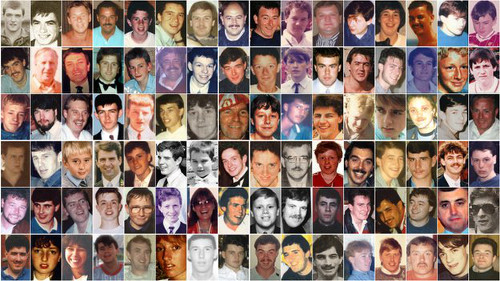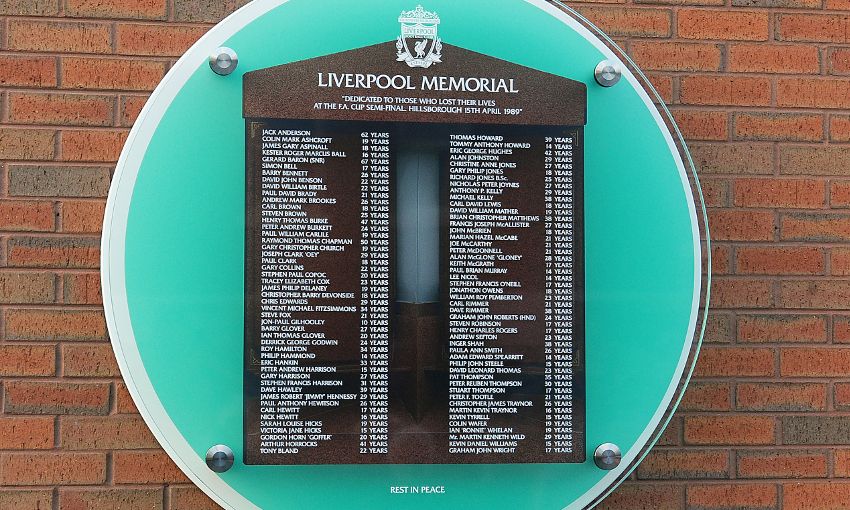Hillsborough inquests - March 14
The Hillsborough inquests commenced on March 31, 2014 and are the subject of reporting restrictions that have been imposed by the Attorney General's office. Liverpool Football Club is respectful of these restrictions and will therefore only be making available updates from other media channels for the duration of the inquest.

The report below - and the witness testimony contained within it - does not necessarily reflect the views of Liverpool FC. Please be aware that the reports on these pages will contain evidence about the day of the disaster which may be distressing.
To view archive reports from each day of the inquest hearings, click here.
Courtesy of the Liverpool Echo - March 14
The Hillsborough inquests jury was today told it must decide whether match commander David Duckenfield could and should have acted differently.
Coroner Sir John Goldring continued his summing up of the case today as the court resumed following a break of more than a week due to juror illness.
As he completed summarising the evidence of Mr Duckenfield, the chief superintendent on charge on April 15, 1989, Sir John said: “Members of the jury, before I move away from Mr Duckenfield’s evidence, may I just make a few points.
“You will, of course, need to consider it with great care in relation to a number of questions in your questionnaire.
“Some of those questions require you to consider whether he made mistakes, if so, what were the consequences of those mistakes, how serious they were.
“I repeat, you should make your judgements on his conduct by asking whether he could and should have acted differently in the situation he was facing.
“Of course you don’t make judgements based on hindsight.
“You should take into account the conditions he was facing when deciding what he should have done and what consequences he should have foreseen.
“You may take in to account what others in the control box did and what they said they foresaw.”
“The point was repeatedly made on Mr Duckenfield’s behalf that Mr (Bernard) Murray and others in the police control box did not foresee any risk to those in the pens when the order was given to open the gates
“Of course it is open to you to find that they all made mistakes, even serious mistakes.”
The inquests into the 96 deaths heard that Mr Duckenfield had seen fans climbing out of the central pens and had sent Chief Inspector Robert McRobbie to the pitch to see what was happening at 2.59pm - seven minutes after he gave the order to open exit gate C to allow fans into the ground.
Sir John said: “It did not occur to him, he said, that one possible cause of the problem was overcrowding in the pens.
“He did not consider the cause was connected with the ingress of fans through gate C.
“He thought there might have been some crowd disorder or problem.”
The jury was also reminded of Mr Duckenfield’s evidence about speaking to FA chief executive Graham Kelly when he came to the police control box at 3.15pm with colleague Glen Kirton and Sheffield Wednesday club secretary Graham Mackrell.
The coroner said: “Mr Duckenfield said that he said to them ‘something in the order of some fans have got in through a gate, which was my belief in respect of one instance’.
“He said to us he could not recall the exact conversation.
“He said he did not recall making reference to gates having been stormed.”
Mr Duckenfield had told the court: “It was a very difficult moment, a tense situation, people were coming and going, making various demands of me and I think frustration was increasing because we couldn’t get on with the job.
He added: “What I didn’t say to Mr Kelly was ‘I have authorised the opening of the gate’.”
The coroner said: “He said (..) that he was not trying to communicate that unauthorised access of the stadium by the fans was the cause or part of the cause of the problems unfolding on the pitch.”
He added: “He said that he considered what he told them was a lie - ‘I certainly now appreciate it was or might be wrong and completely open to misinterpretation’.
“He said he thought he realised that as soon as they had gone. He did not do anything to correct that impression.
“When asked why not, he said ‘I was in a situation that I was totally untrained for, totally unprecedented and I make no excuses’.”
Mr Duckenfield said he apologised “unreservedly” to the families for what he said.
The coroner said Mr Duckenfield told the court he went to police headquarters later that day and told Chief Constable Peter Wright he had authorised the opening of the gate.
But, the jury was shown a transcript of Mr Wright’s press conference that evening in which he said the instruction to open the gate would have come “from a senior officer in the vicinity of the gate”.
Sir John said: “Members of the jury, no doubt you will want to ask yourselves how the chief constable came to say that.
“Mr Duckenfield said that he had told the chief constable that it was he who had ordered the gate to be opened.
“He said that he and the chief constable had not discussed shifting the blame lower down the police ranks.”
***
The coroner in the Hillsborough inquests reminded the jury of “failures” in policing pointed out by an expert witness.
Sir John Goldring, who resumed his summing up this morning by recapping evidence of match commander David Duckenfield , told the court that policing expert Douglas Hopkins had given his opinions on the actions of officers on April 15, 1989.
The inquests into the 96 deaths heard that Mr Hopkins made a number of observations, including that cordons should have been used to filter fans to the Leppings Lane turnstiles and that the policy of allowing fans to find their own level on the terraces was flawed.
When shown BBC footage of the central pens of the Leppings Lane terrace at 2.40pm on the day, Mr Hopkins said he thought most match commanders would have concluded that the central section of the terrace was overfull.
Sir John said: “He would have been taking steps to prevent any further people going into it.
“Also, he would try to remove some.”
Mr Hopkins said a video clip of the crowd outside the turnstiles at 2.41pm showed a situation which appeared “exceedingly dangerous” and that it was a critical and major failing that kick-off was not put back at that point.
The former Met police officer had told the court that the match commander should have made sure the tunnel to the central pens was closed before exit gate C was opened.
The coroner said: “He agreed that putting all the failures between 2.25pm and 2.52pm together it amounted to a failure which was ‘well below what you would have expected from a superintendent and a chief superintendent with 29 years experience’.”
The coroner also began to sum up evidence of the police response to the disaster.
Reminding the jury of the evidence of Nottinghamshire sergeant Adrian Brazener, Sir John said: “He said he clearly saw police officers appearing to push fans back down into the pens.
“That gave him the initial impression that it was a pitch invasion.
“As he got closer, he saw that it was not.
“He said he went up to the fencing. He pulled at police officers, saying that they should let people get over the fence.”



